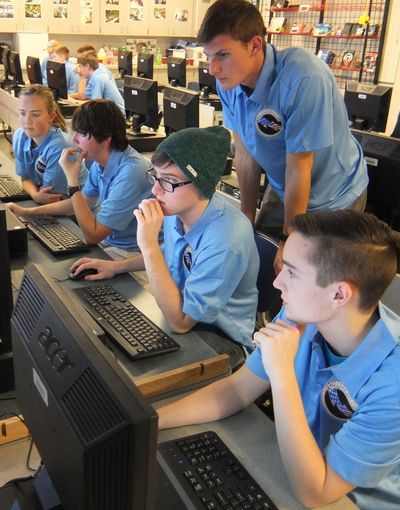CV CyberPatriots test skills against hundreds in nation
Two teams score in top 11 percent in computer skills competition

Central Valley High School students are learning to close computer network gaps that can allow hackers to sneak in.
The school’s new CyberPatriots group – 26 students and three teams – teaches students complex computer skills in an after-school program focused on cyber security. Other Spokane-area high schools also have participated in the program in the past.
CV’s team competed Saturday for the first time against hundreds of others nationwide. Two teams scored in the top 11 percent.
“The key for students is to know how to go in (to a computer operation system) and shut down certain services or install a firewall or beef up a server without disturbing the system as a whole,” said teacher Joe Pauley.
CyberPatriot is the National Youth Cyber Education Program created by the Air Force Association to encourage students in careers such as cyber security and in STEM (science, technology, engineering and mathematics) fields.
The students meet every Monday after school and receive training from security experts in the field. Central Valley students are working with three mentors who are computer experts at TierPoint Cloud Computing and F5 Networks, Inc.
The security specialists help lead weekly training sessions about cyber security concepts to help students prepare for competitions.
For student Ryan Baker, participating seemed like a natural. He’s savvy with computers; always has been, he said.
Over three months, the amount of information he’s learned is “more than I’ve ever learned and probably more than most will learn in their lifetime,” he said.
Riley Madrian, 17, who has taken German from Pauley for three years, wasn’t sure if she’d like it. Now, she’s hooked.
“It’s like trapping someone who is super sneaky. It’s relevant,” Madrian said. “It’s like what should be happening at Target and Home Depot to protect people from their identity being stolen.”
Vulnerabilities in those stores’ networked computer systems gave hackers access to thousands of credit card numbers in recent months.
Madrian had planned on a college major in music performance, but now she’s considering adding some computer science.
The high school senior is one of six girls on the team. “Not an ideal balance,” Pauley said. “Not too far along yet, but so far, so good. There’s been quite a bit of buzz.”
The mentors are already seeing talent in young participants, he said. One of them “was so impressed that he asked for the students to do a presentation on how to harden (secure) an operation system.”